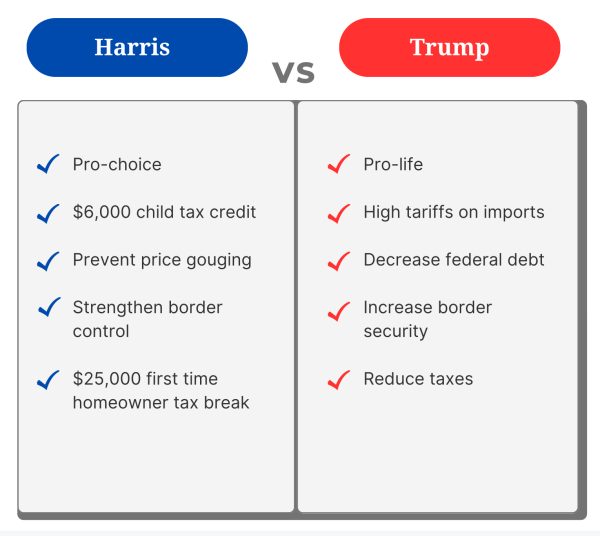Since America’s founding, there has been one issue that has been consequential in all of our country’s presidential elections: the debate between supporting a candidate because of their policies and judging their viability for the presidency in terms of their character. In an ideal world, the president of the United States would possess both the quality of character and efficacy of policies expected of the leader of one of the world’s greatest global superpowers, but the world we live in is far from ideal.
Due to this conundrum, voters are often forced to choose their preferred candidate based on which aspect of a presidential nominee they value the most. Some argue that a prospective president’s moral integrity should take precedence over the policies they promote, while others argue that their character should come second to the practical consequences of their policies and ideals.
A large part of modern politicians’ campaigns are the platforms of the political parties they represent. Although people may not approve of a certain nominee, many still opt to vote for a candidate on the basis that they belong to the political party they support. This development is due to the modern political doctrine that if you vote a presidential nominee into office, you essentially vote their party into office as well.
In Andrew Jackson’s 1828 election, he set a precedent that would determine the course of American political policy: the “to the victor go the spoils” system. His display of presidential authority in removing all of his predecessors’ government officials from office set the principle that once a president is elected into office, they get to bring their administration and supporters along with them.
The major implication of this system is that if you vote for a candidate based on their political party, the beliefs of that party will be upheld in all branches of the government for the length of the president’s term, a prospect which understandably appeals to voters who lean strongly towards one political party or another.

In this election especially, there are a number of controversial topics being debated by the Republican and Democratic parties, namely the issues of abortion, the national economy, and border control. These are issues of the utmost importance to many voters in the upcoming election, and will likely influence their choice of candidate, regardless of their interpersonal opinion on the nominee they vote for.
Dr. Jeff Gall, the cochair of the history department at Westminster Christian Academy, pointed out that all viable presidential candidates should have a certain moral bar to which they should be held accountable:
“I really think they’re both important, but I’m not going to consider policies until I’m convinced their character is above a certain bar. Nobody has perfect character, but there is a certain standard that we certainly can expect any candidate to meet, or a public official to hold. If they don’t have that, I’m not even going to consider the policies.”
It is by no means unreasonable to suggest that the leaders of our country should be held to a certain moral standard. The functioning of democracy itself depends on the dedication of its leaders to the goal of the welfare of America and its people. If a nominee simply seeks the position of president as a means to their own personal gain, then they will not accomplish the purpose of a democratic republic: to serve its people and their needs.
Furthermore, in his famous 1796 Farewell Address, George Washington himself states the importance of morality in the proper functioning of a democratic government.
In his speech, Washington refers to religion and morality as the “indispensable supports” on which all governments must stand in order to properly serve their people. This sentiment still rings true today, because only people capable of putting the desires of their countrymen above their own personal interests and exhibit the basic qualities of honesty and integrity have the capacity to make decisions that will propel America towards a brighter future.

In reality, these issues do hold great significance for the future of our country. Our government’s decisions and policies on how to deal with border control issues, the health of our economy, and the abortion rights issue will have a direct impact on the lives of millions of Americans. In many ways, this election is a turning point for our country in terms of the direction America is headed, and perhaps the course the captain takes in steering our ship is more important than the captain themselves.








